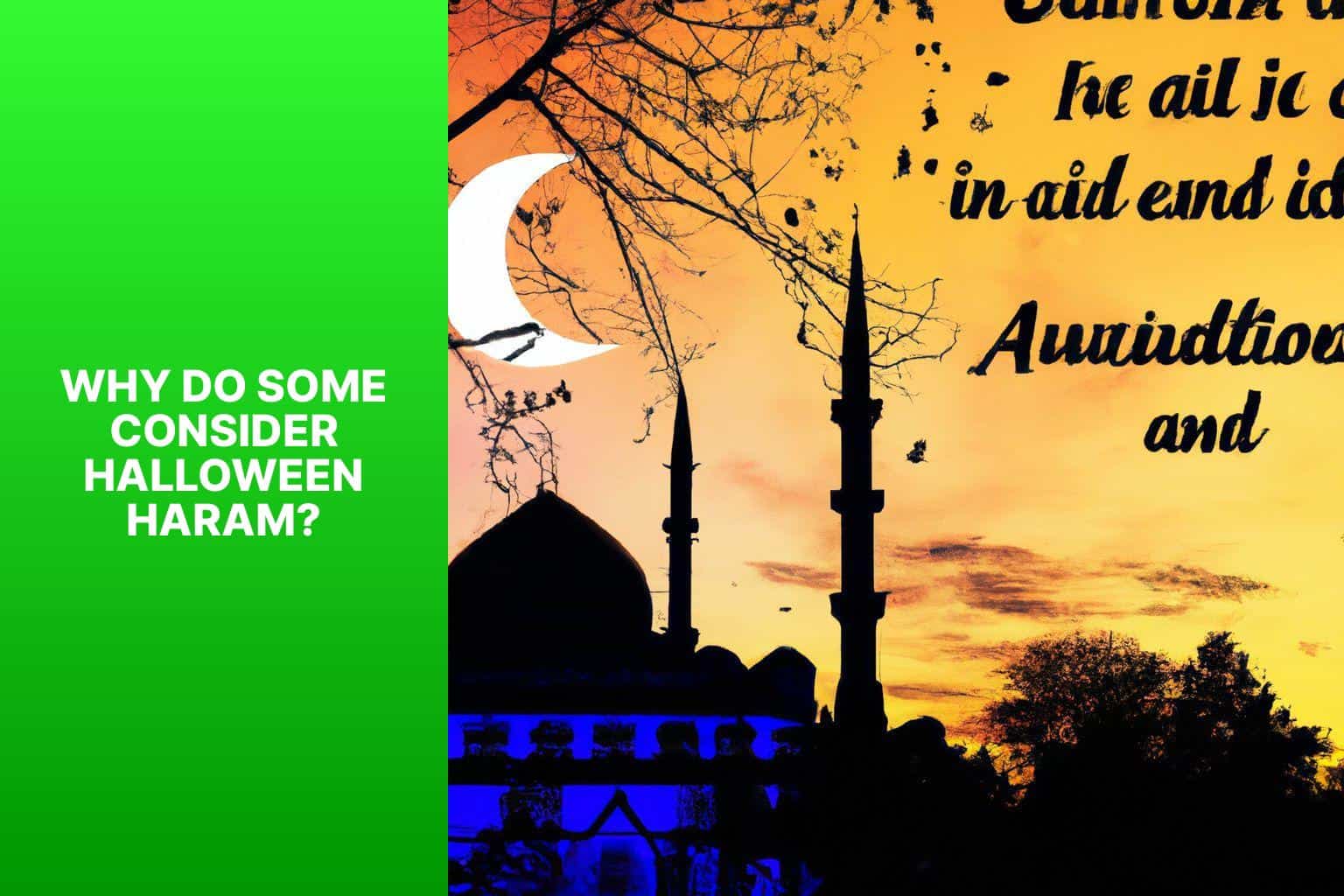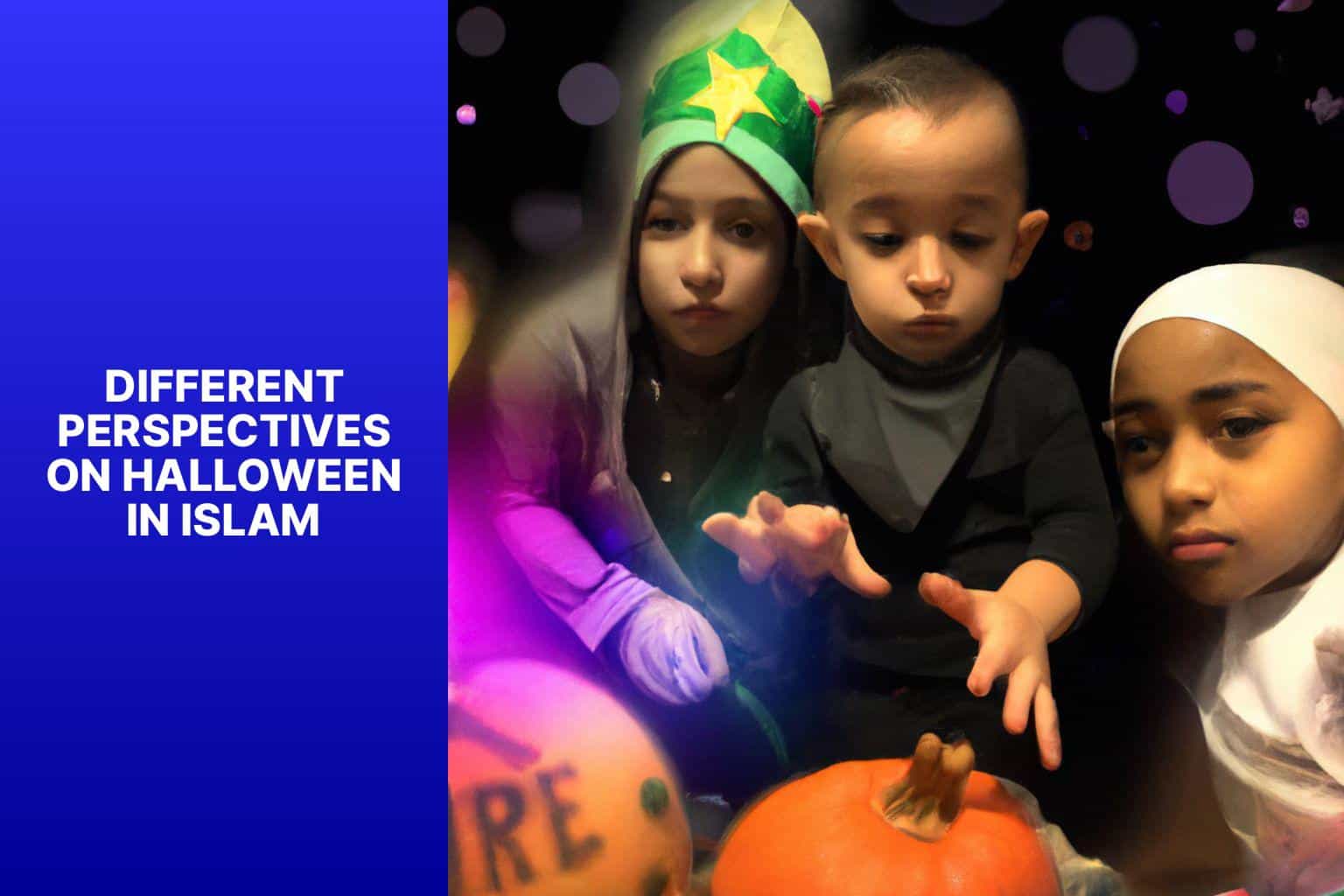Understanding the Concept of “Haram” in Islam
In Islam, the concept of “haram” refers to actions, behaviors, or practices that are prohibited or forbidden according to Islamic teachings. It is essential to have a clear understanding of this concept to discern why some consider Halloween as haram.
Why Do Some Consider Halloween Haram?
Various reasons contribute to the belief that Halloween is haram in Islam. Here are three key points to consider:
Pagan Origins and Practices: Halloween has its roots in ancient pagan festivals, such as Samhain, which were associated with honoring the dead and celebrating the end of harvest season. Some Muslims view participating in Halloween celebrations as a form of participating in non-Islamic rituals.
Association with Witchcraft and Occultism: Halloween is often associated with imagery and practices related to witchcraft, supernatural beings, and occultism. These themes contradict Islamic beliefs, which condemn engaging in practices related to magic or seeking supernatural powers.
Religious Significance and Cultural Appropriation: Halloween is deeply ingrained in Western cultural traditions and is celebrated primarily as a religious holiday in other parts of the world. Some Muslims argue that participating in Halloween may be seen as cultural appropriation, as it involves adopting rituals and customs that contradict Islamic principles.
Different Perspectives on Halloween in Islam
Islamic perspectives on Halloween vary among individuals and communities. Here are two common approaches:
Prohibition and Avoidance: Some Muslims adhere to a strict interpretation of Islamic teachings and choose to avoid any participation in Halloween festivities altogether. They consider it better to abstain from activities that may be perceived as contradicting their religious beliefs.
Cultural Adaptation and Alternative Celebrations: Others adopt a more flexible approach. They may choose to adapt certain cultural aspects of Halloween while omitting its religious or pagan elements. In this case, alternative celebrations that align with Islamic values, such as community gatherings or charitable acts, may replace traditional Halloween practices.
Common Arguments Against Halloween in Islam
Critics of Halloween in an Islamic context put forth several arguments against it, including:
Encouraging Devil Worship and Evil: Some argue that Halloween celebrations involve elements that symbolize evil, encourage devil worship, or glorify immoral behavior. These arguments stem from the belief that Halloween may lead individuals astray from the path of righteousness.
Breaking Monotheistic Beliefs: Halloween’s association with supernatural beings and occult practices is seen as contradicting the fundamental Islamic belief in the oneness of Allah. Engaging in such practices may be viewed as compromising the monotheistic principles of Islam.
Promoting Harmful Practices and Immorality: Critics argue that Halloween celebrations can promote harmful behavior, such as excessive partying, vandalism, or inappropriate costumes. They believe that these practices contradict Islamic teachings on modesty, decency, and responsible behavior.
Understanding the reasons behind the perception of Halloween as haram in Islam provides insight into the different perspectives and beliefs within the Muslim community regarding this popular holiday.
- Halloween is considered haram in Islam due to its pagan origins, association with witchcraft and occultism, and cultural appropriation.
- Different perspectives on Halloween in Islam include prohibition and avoidance or cultural adaptation and alternative celebrations.
- Common arguments against Halloween in Islam include it encouraging devil worship and evil, breaking monotheistic beliefs, and promoting harmful practices and immorality.
Understanding the Concept of “Haram” in Islam
The understanding of the concept of “haram” in Islam is essential for adhering to Islamic law. Haram refers to actions, behaviors, or substances that are forbidden according to Islamic teachings. To live a righteous lifestyle, Muslims need to grasp what is considered haram and abstain from engaging in those activities.
Haram actions encompass theft, adultery, consuming alcohol, and gambling. Engaging in these actions is considered sinful and has negative spiritual consequences. Muslims are encouraged to refrain from participating in haram activities to maintain their moral integrity.
In terms of substances, pork and alcohol are prime examples of haram foods and drinks. Muslims are prohibited from consuming these items due to their impurity and harmful effects on both the body and soul.
Understanding the concept of haram is paramount for Muslims striving to live according to Islamic principles. It provides a clear moral framework and guides one’s actions and choices in daily life. By consciously avoiding haram actions and substances, Muslims aim to foster righteousness and obedience to Allah. Taking responsibility for self-education about what is considered haram is crucial in making informed decisions and avoiding it.
Why Do Some Consider Halloween Haram?

Photo Credits: Rickyshalloween.Com by George Ramirez
Curious about why Halloween is deemed “haram” by some? Well, in this section, we’ll unravel the reasons behind this belief. From its pagan roots and associated practices to the connection with witchcraft and occultism, we’ll explore the factors that contribute to the perception of Halloween as haram. We’ll touch upon its religious significance and controversies surrounding cultural appropriation. Get ready for an intriguing journey into the complexities of Halloween’s controversial status!
Pagan Origins and Practices
Pagan Origins and Practices are an important aspect of the discussion surrounding Halloween in Islam. Halloween can be traced back to ancient Celtic festivals like Samhain, which marked the end of the harvest season. During these festivals, the Celts believed that spirits returned to Earth, so they lit bonfires and wore costumes to ward them off.
In addition, Divination and fortune-telling were also part of the pagan Halloween practices. People would carve faces into turnips or pumpkins and place candles inside, thus establishing the jack-o’-lantern tradition.
It is worth noting that some Muslims perceive these pagan practices as conflicting with Islamic beliefs, which prioritize monotheism and discourage superstitions and polytheism. Halloween is considered by certain Muslims as a celebration that promotes sinful and immoral concepts and activities, such as occultism and witchcraft.
Nevertheless, it is essential to acknowledge that not all Muslims hold the same view of Halloween. Some Muslim communities opt for alternative celebrations or cultural adaptations during this season. Ultimately, whether Halloween is considered haram or not depends on an individual’s understanding of Islamic teachings and personal beliefs.
Association with Witchcraft and Occultism
The affiliation between Halloween and witchcraft and occultism is prominently recognized as the primary motivation behind why a few Muslims view it as haram. Joining in Halloween celebrations that include practices related to witchcraft and the occult contradicts the teachings of Islam. Muslims firmly believe in the concept of the oneness of God and perceive the pursuit of supernatural power or knowledge outside of Allah as prohibited.
The connection between Halloween and witchcraft and occultism is distinctly evident in the costumes, decorations, and activities that are commonly associated with this holiday. The act of dressing up as witches, ghosts, or demons, and engaging in activities such as tarot card readings, ouija boards, or casting spells all contribute to this particular association.
Muslims are strongly advised to steer clear of any involvement in rituals associated with witchcraft and the occult, as it directly contradicts the fundamental principles of monotheism and belief in Allah’s unlimited power and knowledge. Taking part in such practices can also have detrimental effects on one’s spiritual well-being and can lead to negative influences.
It is crucial for Muslims to have a comprehensive understanding of the origins and symbolism behind Halloween traditions and to recognize how they clash with the teachings of Islam. By choosing to abstain from engaging in any activities involving witchcraft and the occult, Muslims can effectively adhere to their religious beliefs and ensure the preservation of their spiritual well-being.
Religious Significance and Cultural Appropriation
Religious Significance and Cultural Appropriation are key factors in why some view Halloween as Haram in Islam. Halloween’s religious significance is rooted in its association with pagan practices and beliefs. Throughout history, Halloween has been linked to divination and communicating with spirits, which contradict Islamic monotheistic beliefs.
The cultural appropriation aspect of Halloween concerns some Muslims. Cultural appropriation involves the adoption or use of elements from a minority culture by a dominant culture. Halloween, originating from Celtic pagan traditions, has been commercialized and altered by mainstream cultures, often distorting its original meaning.
From an Islamic perspective, participating in Halloween celebrations can compromise one’s religious identity and involve practices incompatible with Islamic teachings. Muslims are encouraged to uphold their faith and avoid activities that may undermine their beliefs.
It’s important to note that individual interpretations may differ, and some Muslims may choose to adapt or find alternatives to Halloween that align with their religious beliefs. Ultimately, deciding whether to participate or not in Halloween festivities depends on personal convictions and a thorough consideration of Islamic principles.
Different Perspectives on Halloween in Islam

Photo Credits: Rickyshalloween.Com by Charles Hernandez
Unveiling how Halloween is viewed within the Islamic faith, this section exposes the varying viewpoints on the topic. From the prohibition and avoidance of Halloween to the cultural adaptation and alternative celebrations, we delve into the contrasting approaches taken by different Islamic communities. So, let’s explore the diverse opinions, beliefs, and practices surrounding this contentious holiday.
Prohibition and Avoidance
In Islam, there are Muslims who choose to adhere to the prohibition and avoidance of Halloween. This is due to the recognition of its pagan origins, association with witchcraft and occultism, and the concern of cultural appropriation. These Muslims firmly believe that participating in Halloween contradicts their monotheistic beliefs and undermines the integrity of their Islamic practices.
The decision to prohibit and avoid Halloween is deeply rooted in personal interpretations of Islamic teachings. While some Muslims decide to abstain from Halloween, it is important to note that others may have different perspectives and choose to celebrate alternative holidays instead.
Cultural Adaptation and Alternative Celebrations
Cultural adaptation and alternative celebrations play a significant role in addressing concerns about Halloween in Islam. Instead of completely avoiding the holiday, some Muslims choose to adapt its festivities to align with their religious beliefs.
Muslim families organize alternative events and gatherings on Halloween. These events provide a safe space for children to enjoy themed activities, dress up in costumes, and receive treats in a controlled environment. By creating their own celebrations, Muslims maintain the spirit of fun and togetherness while following Islamic principles.
In addition, some Muslim communities offer educational programs during Halloween. These programs teach children and families about the history and origins of the holiday, emphasizing its non-Islamic roots. By providing educational alternatives, cultural understanding and awareness are fostered, allowing Muslims to be part of society without compromising their beliefs.
It should be noted that not all Muslims accept cultural adaptation and alternative celebrations. Some individuals and religious scholars advocate for completely avoiding Halloween due to its perceived pagan origins and associations with witchcraft and occultism. The decision to engage in cultural adaptation or abstain from Halloween depends on individual interpretations and convictions.
Halloween has Celtic roots in the festival of Samhain, marking the end of the harvest season and the beginning of winter. It included bonfires and costumes, as people believed the boundary between the living and the dead was blurred on October 31st. The festival was incorporated into the Christian calendar as All Hallows’ Eve, the night before All Saints’ Day. Over time, Halloween became a secular holiday with costume parties, trick-or-treating, and decorations.
Common Arguments Against Halloween in Islam
In the world of Islam, a debate ensues around the celebration of Halloween. In this section, we will dive into the common arguments against Halloween in Islam. From the concern of encouraging devil worship and evil to the potential breaking of monotheistic beliefs, and the promotion of harmful practices and immorality, we’ll explore these contentious topics and shed light on the opposing views within the Islamic community. Be prepared for a thought-provoking discussion that delves into the intersection of religion and popular culture.
Encouraging Devil Worship and Evil
Halloween is criticized in Islam for encouraging devil worship and evil. Some Muslims argue that activities like dressing up as demons, witches, or devils can promote evil beings. They believe such participation weakens faith and opens the door to harmful influences. Engaging in occult practices, such as divination, fortune-telling, and summoning spirits, is also seen as promoting evil and devil worship. These activities contradict the monotheistic beliefs of Islam, which emphasize worshiping Allah alone. Participating in Halloween celebrations involving such actions deviates from the teachings of Islam and the pursuit of righteousness.
Despite the concerns surrounding Halloween, there are alternative suggestions for Muslims:
– Organize educational events to raise awareness about the Islamic perspective on Halloween and its potential harm.
– Celebrate Islamic festivals like Eid al-Adha and Eid al-Fitr with family and friends to reinforce cultural identity and spiritual growth.
– Engage in charitable activities during Halloween, such as giving to those in need or volunteering at local organizations, to contribute positively to society.
– Focus on strengthening faith and spirituality through acts of worship, such as prayer, fasting, and recitation of the Quran.
– Encourage children to participate in educational and fun Islamic activities that align with the teachings of Islam.
By considering these alternatives, Muslims can maintain their faith and values while avoiding participation in Halloween activities seen as encouraging devil worship and evil.
Breaking Monotheistic Beliefs
In Islam, the concept of Halloween is viewed by some as contradictory to the principle of Tawheed, or the oneness of Allah, and as undermining belief in Allah’s sovereignty. This perspective is based on three primary reasons.
Halloween’s association with pagan customs and worship of multiple deities can be seen as promoting polytheism, which challenges the belief in Allah’s complete control.
The costumes and traditions associated with Halloween often include imagery related to polytheistic religions, potentially leading individuals away from the exclusive worship of Allah and towards idolatry.
Lastlt, Halloween activities such as wearing costumes resembling idols or engaging in superstitious practices go against the principles of monotheism in Islam, thus potentially distorting Islamic teachings and leading to deviation from authentic beliefs.
It is important to note that opinions on Halloween vary amongst scholars and individuals in the Islamic faith. Some advocate complete avoidance of the holiday, while others emphasize cultural adaptation and alternative celebrations. Individuals should seek guidance from their religious authorities and reflect on their understanding of monotheism in Islam to make informed choices.
Promoting Harmful Practices and Immorality
Participating in Halloween can pose a risk of promoting harmful practices and immorality, as per certain religious perspectives. This viewpoint arises from the connection between Halloween and behaviors that are deemed inappropriate or contrary to moral values. Some common arguments against Halloween include:
1. Encouraging harmful practices: Halloween is often associated with acts of vandalism, pranks, and excessive consumption of sugary treats. These activities can encourage harmful behavior, particularly among young individuals, and may result in property damage or health issues such as tooth decay.
2. Promoting immorality: Halloween costumes frequently involve provocative outfits that are considered inappropriate or immodest. Certain Halloween parties or events may encourage behaviors that disregard religious teachings, such as excessive drinking or casual relationships.
3. Diluting moral values: Some argue that partaking in Halloween can dilute moral values. This celebration involves the acknowledgment of supernatural elements and engagement in activities associated with dark themes like witchcraft or occultism. Such practices are seen as conflicting with monotheistic beliefs and promoting actions considered sinful or immoral.
It is important to note that these arguments reflect specific religious beliefs and individual interpretations. The decision to participate in Halloween ultimately depends on personal convictions and adherence to religious teachings.
Frequently Asked Questions
Is Halloween permissible in Islam?
According to Islamic scholars, Halloween is considered haram, or forbidden, in Islam due to its pagan and Christian origins. Participating in Halloween can be seen as engaging in other religious and cultural practices, which goes against Islamic teachings.
Why is participating in Halloween seen as engaging in other religious and cultural practices?
Halloween originated from an ancient pagan festival called Samhain celebrated by Celtic people over 2,000 years ago. The early Celts dressed up in masks and costumes to please evil spirits and blend in with them. The church later attempted to replace the Celtic festival with a church-sanctioned holiday. Therefore, participating in Halloween involves adopting customs and traditions rooted in other religions and cultures.
What are the main reasons why Halloween is considered haram?
There are several reasons why Halloween is considered haram in Islam. It may involve idolatry or Shirk, which is forbidden in Islam. Muslims are prohibited from imitating other people and wasting their wealth, both of which can be associated with Halloween traditions. Celebrating Halloween goes against the basic principles of the Islamic way of life.
Is giving out candy on Halloween allowed in Islam?
No, giving out candy on Halloween is considered haram in Islam. Muslims are prohibited from participating in the tradition of trick-or-treating or giving out candy. The Prophet Muhammad has forbidden following the customs of other people, and this tradition can be seen as encouraging begging, which is discouraged in Islam.
Why is dressing up for Halloween considered haram in Islam?
Dressing up for Halloween is considered haram in Islam because it involves adopting costumes and traditions from other religions and cultures, specifically Christian culture. Muslims are advised not to allow traditions and costumes from other religions to enter Islam. The Prophet Muhammad has forbidden following the customs of other people, and it is mentioned in the Quran that Muslims should not adopt the customs of other religions.
Is attending a Halloween party permissible in Islam?
No, attending a Halloween party is considered haram in Islam. Even if the party is just for fun and does not involve religious rituals, participating in the celebration of infidels is seen as contributing to the success of their event. The Prophet Muhammad forbade the celebrations of the disbelievers in Madina, and Allah gave Muslims the two Islamic holidays, Eid al-Fitr and Eid al-Adha, as replacements.










